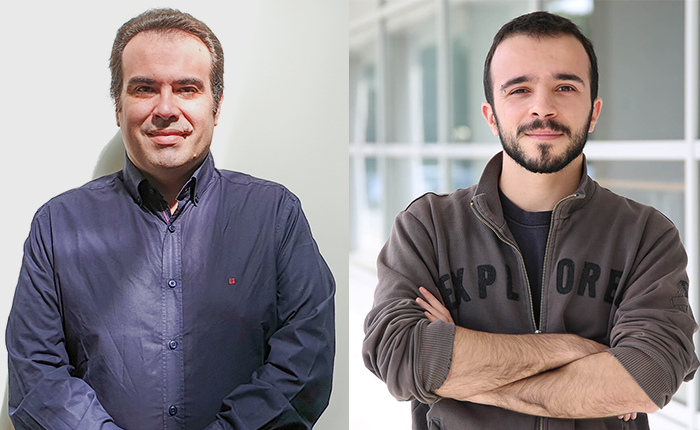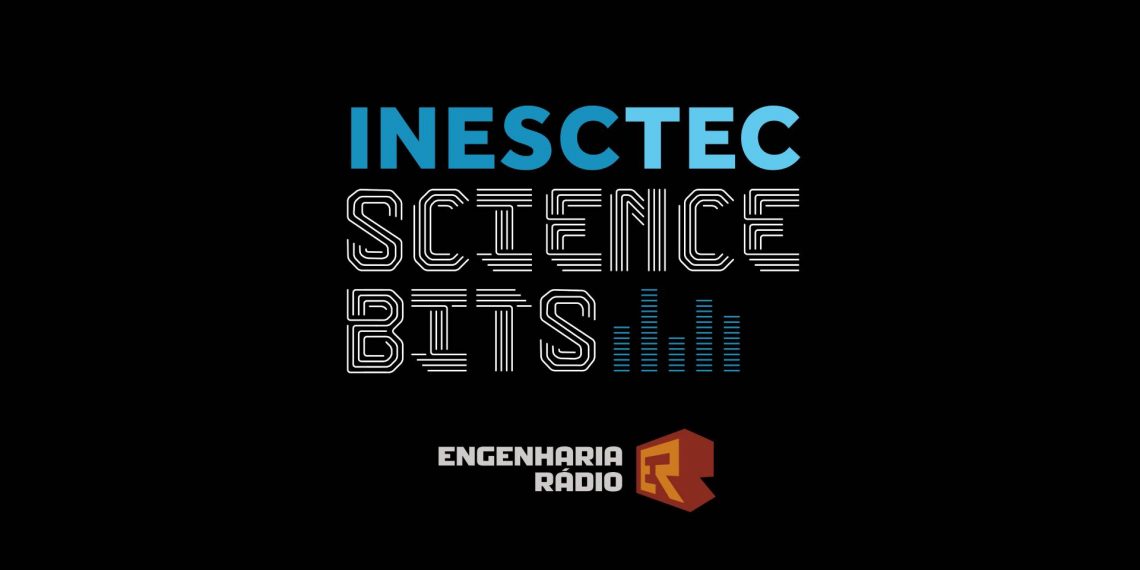NESC TEC Science Bits – Episode 5
PODCAST INESC TEC Science Bits (23:41 — 21.7MB)
Guest Speakers:
Artur Rocha, Centre for Information Systems and Computer Graphics
Gonçalo Gonçalves, Centre for Information Systems and Computer Graphics
Keywords: software | Personalised Health Research | epidemiology | immunogenetics | security by design

Production of science to support healthcare research
Our focus is helping other health researchers develop new treatments, before they become common practice.
During the initial stages, which started about ten years ago, we worked with researchers from the fields of psychology and psychiatry, as well as other mental health professionals, in order to convert existing interventions i.e. cognitive-behavioural therapy, used to combat depression, into digital format. This allowed us to validate their effectiveness in this type of format.
After proving that said digital interventions, as long as properly balanced with a face-to-face component, are not only as effective, but can actually surpass the effectiveness of traditional ones, we moved on to the following stage in this sub-area: developing a type of digital “test tube” to create, test and validate new interventions. We’re talking about certain interventions to depression (e.g. emotion-focused therapy) and other conditions, such as anxiety, post-traumatic stress disorder, substance abuse or other issues.
One area, one platform
Fields such as epidemiology or immunogenetics have their own methods, because they are mainly based on cohort studies i.e. analysing and systematising knowledge about a set of people with a common characteristic, and drawing conclusions according to that sample, in order to improve the quality of life of each individual.
Hence, there are different platforms for each field. We like to use the term “software ecosystems” when referring to said platforms, since they comprise a set of components that interact with each other.
Differences in a set of common concerns
Despite the differences, there are a number of common concerns. To begin with, the method used to organise data, according to the FAIR principles, thus making them compatible with the rules and good practices of Open Science. Moreover, the need to balance this openness with the preservation of the individuals’ privacy rights, particularly important in health research.
There are also other ethical issues regarding research, such as the ability to include the knowledge necessary to replicate the data processing and analysis, so that everyone can verify it. This way, others can use them as a basis for supporting new scientific knowledge and improving said scientific fields, instead of using them to generate yet another publication whose claims no one can actually replicate.
How to guarantee data privacy?
The issue of data privacy has always been fundamental. Medical studies have always addressed ethical aspects, and followed procedures to preserve the participants’ anonymity. These rules have become more objective in recent years, thanks to the GDPR.
These aspects became even more important as we seek to compare the results of our studies with the outputs of other similar institutions. In addition, the statistical influence of 20 European studies is significantly greater than that of my own study by itself.
The most obvious solution would be adjusting all these data and carry out shared analyses; but maintaining anonymity in these circumstances is quite difficult… with increased risks of re-identification. In addition, there are local guidelines that sometimes prevent data from leaving the institution.
Therefore, we favour a federated approach i.e. the data from each cohort study is properly curated and preserved by the institutions, thus effectively taking responsibility for their participants’ data.
This way, institutions can treat all data according to the FAIR principles, which enables their dissemination and reuse. At the same time, it is possible to carry out distributed analyses, paralleling the algorithms, focusing the processing on the data and transferring back only the coefficients or aggregated data, instead of analysing them centrally.
Happ-e: INESC TEC developed the first online cohort of adults born prematurely
The online cohort Happ-e was created as part of the RECAP preterm project, a H2020 project that started in 2017, with INESC TEC as one of the partner entities. The overall objective of the RECAP project is to improve the health, development and quality of life of children and adults born prematurely.
The project also focused on the implementation of a distributed system for the storage, processing, cataloguing and analysis of data from national and European cohorts.
The platform aims to optimise the use of population data for research and innovation in health, social and educational policies
In traditional cohorts, healthcare facilities (e.g. hospitals) are responsible for the selection of participants, in order to ensure the regular provision of information, through medical examinations, interviews or questionnaires.
In this sense, Happ-e makes the monitoring process less expensive and more easily scalable than traditional cohorts do. Furthermore, by avoiding face-to-face participation, it also ends up becoming much more convenient, not only for researchers, but also for the participants themselves.
Digital platforms vs. face-to-face studies: software solutions can have an equal or greater degree of customisation
One of the advantages of software solutions is the systematisation of procedures, which makes them more coherent and auditable. In other words, we have more ways to understand why they work or why they do not work.
One of the main causes for the failure of treatments is often the absence of it, or the fact that we do not do it regularly.
Now, we have managed, in a systematic and non-intrusive way, to detect when this happens, thus encouraging adherence to treatment.
In addition, we have greater volumes of information (coming from IoT devices for healthcare, or other sources of “real-world” data), properly structured and with the associated context. This works in our favour, increasing the statistical influence of the analysis and enabling more individualised forecasting algorithms, which take into account the individual’s intrinsic factors, but also those associated with specific contexts.
Computer science and immunogenetics
The common aspect among these fields is the fact that we work with our partners, as a multidisciplinary team, in order to achieve our goals. The iReceptor Plus is not a platform for making vaccines per se, although we have already submitted a proposal with that in mind – together with some partners of this consortium.
Similarly to what we mentioned before, iReceptor Plus focuses on supporting knowledge systematisation considering a very specific type of sequencing data. We are talking about T and B lymphocyte sequencing data, which form the basis of our immune system.
This type of sequencing leads to large volumes of data that contain an individual’s immuno-repertoire. We help our partners structuring knowledge bases and implementing APIS, in order to ensure the interoperability between the different models used to represent said knowledge.
Although many of the processes carried out rely on public data, we are concerned with the security of private data. We apply the principles of security by design and data minimisation to ensure that more data is shared, especially when compared to the amount of data we would be able to share if these mechanisms did not exist.
We also play an important role in data processing, mainly through machine learning algorithms, which help abstracting and systematising said processing, thus ensuring its use not only in the application ecosystem of iReceptor partners, but also in other established platforms like the Galaxy Framework.
Therefore, we are currently at an advanced stage of the research, which may lead to the development of vaccines or other drugs, like those that will be used to fight against COVID-19, or even CAR-T therapies used to treat certain types of cancer.




 News, current topics, curiosities and so much more about INESC TEC and its community!
News, current topics, curiosities and so much more about INESC TEC and its community!